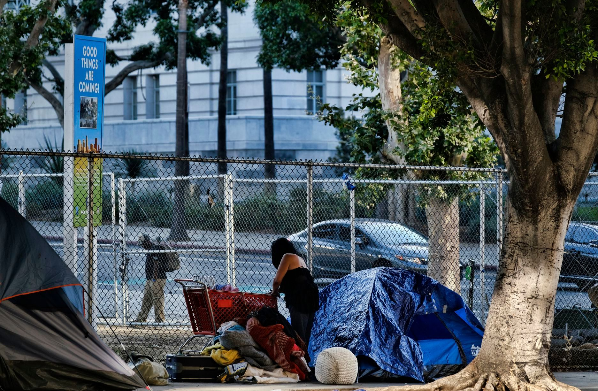We’re seeing a distressing uptick in the number of homeless people living on the streets.
Are public policies causing this epidemic of homelessness?
The city of Boise, Idaho, is appealing to the Supreme Court to overturn a Ninth Circuit ruling that prevents the city from cleaning homeless cites on public property.
Steven Malanga of City Journal points out that however the high court rules, it will have a huge effect on what cities can do to address homelessness. Malanga writes:
At the heart of the Ninth Circuit’s ruling is the liberal thesis that homelessness is an economic problem driven by high housing costs. Several homeless people sued Boise in 2009, alleging that the city did not have the right to remove them from the streets when they had no other housing options.
A lower court ruled in the city’s favor, but the Ninth Circuit reversed that decision and held that the city was “criminalizing” homelessness “on the false premise they [the homeless] had a choice in the matter.” The court essentially accepted the argument that enforcement actions against the homeless plaintiffs constitute cruel and unusual punishment, in violation of the Eighth Amendment.
Homeless advocates also argued that police actions give the homeless arrest records, making it hard for them to find jobs and housing.
But is homelessness primarily an economic problem? Is the reason that most of these unfortunates are on the streets is that they could not afford to pay the rent?
An estimated 40 percent to 50 percent of the street homeless areaddicted to drugs or alcohol, and those proportions run even higher in some cities with acute homeless problems.
In some cases, the homeless refuse to accept placement in shelters even when space is available because of restrictions on drug and alcohol use, curfews, or other rules. In other cases, street sleepers have chosen to live off the grid, preferring this to conventional living. And a substantial number of the street homeless have serious untreated mental illness. Prohibiting cities from intervening makes it difficult for officials to get these people into the legal system, where they might benefit from intervention and rehabilitation programs.
Many homeless people who suffer from mental illness or substance problems would not of course like to have their illnesses treated.
But is it really humane to simply allow them to live on the streets?
Some cities (Seattle, Portland, and San Francisco) have made themselves magnets for homeless people by decriminalizing activities formerly illegal (drug dealing, public urination, and disorderly conduct). Portland is in the vanguard even hosting drug friendly homeless camps.


